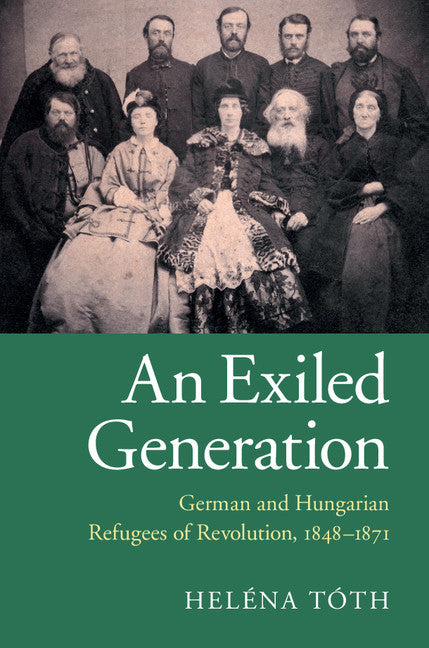Freshly Printed - allow 6 days lead
Couldn't load pickup availability
An Exiled Generation
German and Hungarian Refugees of Revolution, 1848–1871
Heléna Tóth considers exile in the aftermath of the revolutions of 1848–9 as a European phenomenon with global dimensions.
Heléna Tóth (Author)
9781107046634, Cambridge University Press
Hardback, published 30 October 2014
310 pages, 3 b/w illus. 3 maps 2 tables
22.9 x 15.2 x 1.9 cm, 0.61 kg
'The main strength of Tóth's study derives from the stories she found in the dusty corners of archives, such as the anecdote about Johann Georg Holzschreiter, an innkeeper and postmaster from Baden, who settled in the border region in Switzerland but continued visiting his family back home for years until Prussian soldiers captured him, despite the support he got from the townspeople, or the story of Joseph Dietrich, likewise from Baden and similarly someone who regularly crossed the border.' Ágnes Deák, Hungarian Historical Review
Focusing on émigrés from Baden, Württemberg and Hungary in four host societies (Switzerland, the Ottoman Empire, England and the United States), Heléna Tóth considers exile in the aftermath of the revolutions of 1848–9 as a European phenomenon with global dimensions. While exile is often presented as an individual challenge, Tóth studies its collective aspects in the realms of the family and of professional and social networks. Exploring the interconnectedness of these areas, she argues that although we often like to sharply distinguish between labor migration and exile, these categories were anything but stable after the revolutions of 1848–9; migration belonged to the personal narrative of the revolution for a broad section of the population. Moreover, discussions about exile and amnesty played a central role in formulating the legacy of the revolutions not only for the émigrés but for their social environment and, ultimately, the governments of the restoration.
Introduction: 'our story belongs to you'
1. Leaving
2. 'What good does it do to ruin our family?'
3. Exile as a profession, professions in exile
4. The roots of the uprooted: émigré networks
5. Returning
Conclusion.
Subject Areas: Population & demography [JHBD], Social & cultural history [HBTB], Early modern history: c 1450/1500 to c 1700 [HBLH], European history [HBJD]


